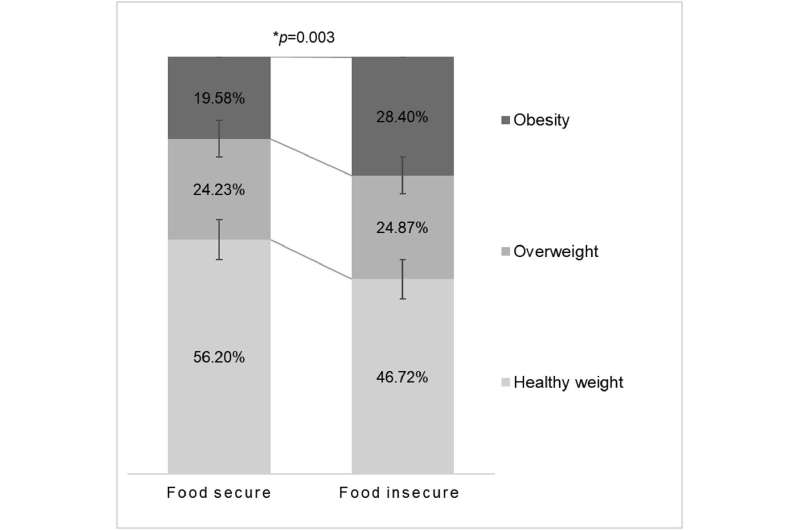This article has been reviewed according to Science X's editorial process and policies. Editors have highlighted the following attributes while ensuring the content's credibility:
fact-checked
peer-reviewed publication
trusted source
proofread
New research investigates the impact of food security on college students' health, stress and well-being

A new study from University of Alabama at Birmingham researchers highlights the impact of food security on college students' health and well-being.
In the study, published in the journal Public Health, researchers investigated the connection between food insecurity, body mass index, diet habits, stress and psychological well-being among college students. The study aimed to shed light on how these factors interplay and potentially affect the overall health of students.
Lead author Yenni Cedillo, assistant professor in the UAB Department of Nutrition Sciences, says college students require access to healthy food to avoid additional stressors that affect their well-being and their food choices.
"Understanding and mitigating the adverse consequences of food insecurity in the college environment is essential to support the overall health and well-being of students," Cedillo said.
The study utilized data from the American College Health Association National College Health Assessment III (fall 2020), encompassing 1,439 college students. Food security was evaluated using the USDA Six-Item Short Form, while PWB was assessed using the Diener Flourishing Scale. Diet habits were measured based on the average servings of fruits, vegetables and sugar-sweetened beverages consumed per day, and stress levels were self-reported by the participants.
The results of the study showed that a significant portion of the college student population, 44.54%, experienced food insecurity, while 55.46% were considered food-secure. The findings indicated that higher levels of food insecurity, older age, full-time enrollment and being a fifth-year student were positively associated with a higher BMI score.
The research also uncovered intriguing insights into how food insecurity impacts students' diet-related behaviors and overall well-being.
Psychological well-being was identified as a mediator in the relationship between food security and BMI among Black students. This suggests that disrupted psychological well-being might be one of the factors influencing the link between food insecurity and BMI in this group.
Additionally, high stress levels were found to mediate the connection between food insecurity and increased intake of sugar-sweetened beverages among students, highlighting the potential role of stress in influencing dietary choices, particularly favoring unhealthy options, among college students facing food insecurity.
Cedillo says this study underscores the significance of addressing food insecurity among college students, not only for its direct impact on BMI but also for its indirect effects on diet habits and psychological well-being.
More information: Y.E. Cedillo et al, Evaluation of food security status, psychological well-being, and stress on BMI and diet-related behaviors among a sample of college students, Public Health (2023). DOI: 10.1016/j.puhe.2023.08.015




















